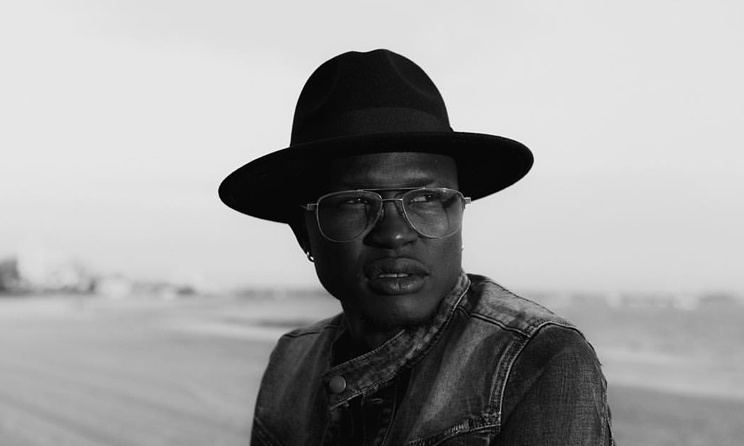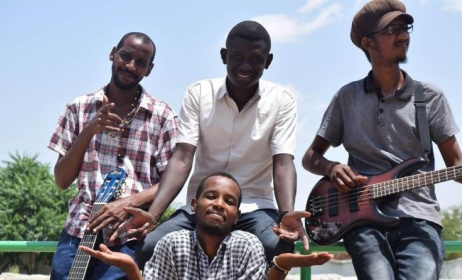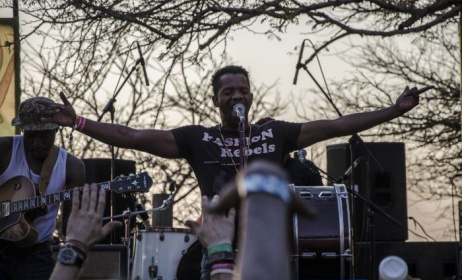South Sudanese music finds a voice in East Africa
This article provides an overview of recent trends in South Sudanese music, particularly one which has seen the country’s contemporary popular music scene dominated by musicians who have returned from exile. These musicians have come to redefine the sound of South Sudan while finding growing audiences in other East African countries.
 Rapper K-Denk has gained noteworthy recognition outside South Sudan. Photo: Facebook
Rapper K-Denk has gained noteworthy recognition outside South Sudan. Photo: Facebook
Historical background
South Sudan gained independence from Sudan in 2011 to become a sovereign nation after a series of wars that lasted more than 22 years and displaced millions of people. The First Civil War lasted from 1955 to 1972 and left more than 500 000 Sudanese dead. The Second Civil War left a further 2.5 million people dead, with a further 4 million displaced between 1983 and 2005.
After independence, South Sudan enjoyed a brief period of peace as its refugees returned from exile. This period marked a boom in the South Sudanese music scene, as musicians brought various influences back with them. But it wasn’t long before a power struggle within the new government triggered a return to conflict. On World Refugee Day (20 June 2017), it was reported that more than 3 million people had fled their homes. This represented a third of the South Sudanese population and led to Africa's biggest refugee crisis since the Rwandan genocide[1].
Influence of migration on South Sudanese artists
The First and Second Civil wars had a profound effect on the South Sudanese music industry, largely because emigrants, who had assimilated new cultures in their countries of refuge, returned with the new musical influences.
Ex-child soldier Emmanuel Jal was rescued by British aid worker Emma McCune, who smuggled him into Nairobi, Kenya, and raised him. In 2005, he released his first album Gua, which means ‘peace’ in his native Nuer tongue[2]. The title track was broadcast across Africa on the BBC, and it gave Jal a spot on Bob Geldof’s 2005 Live 8 concert line-up. He also released a collaboration with North Sudanese folk singer Abdel Gadir Salim titled 'Ceasefire', which brought the two opposing sides of the Sudanese conflict together behind the unifying message of peace[3].
In 2007, rapper Silver X – now one of South Sudan’s most popular musicians who has nine studio albums to his name – first returned from Uganda where he had been a student. He visited a nearby government office, with lyrics in hand, to secure funding to record an album. A bureaucrat working at the office saw the lyrics as a means of inspiring members of the South Sudanese diaspora to return to the country and offered him a $1 000 grant to assist with studio costs[4].
Hip hop artist Lual D’Awol, who grew up in Baltimore, US, and whose stage name LUAL is an acronym for 'Lyrically Untouchable African Legend', is another well-known name in the South Sudanese music scene. He brought back musical influences from the US when he returned to South Sudan in 2009[5]. LUAL's songs address the country's socio-economic challenges, such as in the song 'Dowla Jadit' (New Nation), where the rapper criticises local officials who he claims use the slogan 'We Are a New Nation' as an excuse for a lack of public services such as water and electricity[6].
Born Angelo Maku, Yaba Angelosi emigrated to the US in 2000, later joining a South Sudanese Afrobeat band called Sosa Musica in Nashville, Tennessee. After playing with the band for two years, Angelosi decided to pursue a career as a solo artist. He has performed all over the world, including at the White House during Sudan’s Comprehensive Peace Agreement in 2005. He is the co-founder of Assida Productions[7].
Khor Deng Jang, Khor DJ is another another diasporic artist who has gained success in South Sudan and abroad. Now living in Ethiopia, he was awarded the Best Male Award for his single 'Abibi' at the now defunct Miraya FM Awards in 2008. He has since enjoyed national tours and was the only diasporic artist who was invited to perform at the South Sudan Independence Celebrations in 2011[8].
The same trend holds true when it comes to the most popular female artists in South Sudan. Singer Annet Angaika, better known as Neetah Baby, lived in exile until she was 15 years old. Born in a refugee camp in northern Uganda, she only returned to South Sudan in 2008 when independence was on the horizon. She turned to singing and later produced the popular single 'Binia Wewe' (Foreign Girl)[9].
Dancehall artist Tutu Baibe also has a connection to the South Sudanese diaspora: she started singing while studying at St Lawrence University in Uganda in 2015, before returning to dominate South Sudan’s popular Top 10 Countdown show on Eye Radio, which led to celebrated collaborations with local artists including Silver X[10].
Growing influence of South Sudanese artists in East Africa
As well as having a large impact on the South Sudanese music scene, some of these returning musicians are finding an increasingly large audience in other East African countries.
South Sudanese musician Kuonck Deng, popularly known as K-Denk, is arguably more popular outside South Sudan than in it. The former Tusker Project Fame contestant is known across East Africa for his 2012 song 'Niko' featuring Kenyan radio presenter Sana. He records most of his music in Ethiopia and Kenya[11].
In 2015, Emmanuel Jal performed in Nairobi, Kenya, at the Ndovu Zetu Concert held at the UN Recreational Centre, alongside other regional stars such as Tanzania’s Venessa Mdee and Congolese singer Syssi Mananga as well as Kenya's Sauti Sol, Sarabi and Juliani. The concert kicked off the Kenya Wildlife Festival, an initiative of the Kenya Wildlife Service and the Ministry of Environment, Water and Natural Resources to celebrate Kenya’s natural heritage and spotlight the dangers of elephant poaching. Jal and Juliani later went on a London tour in March 2015[12].
Silver X learnt Kiswahili in a bid to appeal to Kenyan audiences and collaborated with musicians in that country. In 2015, he released 'East African Lover' with Renee and launched the video in the capital Nairobi. These efforts saw him nominated in the Best East African Artist category at the 2017 Bingwa Music Awards[13].
In 2016, singing brothers MB Law (Miyen Awet) and Rhapsody (Alor Kuol Alor) earned airplay on TV and radio stations across East Africa after the release of 'Sambala', which featured Ugandan BET Award nominees Radio & Weasel[14]. The track earned the duo a Song of the Year Award (South Sudan) at Uganda’s HiPipo Music Awards[15]. Thereafter, they collaborated with Uganda's Jose Chameleone on another popular single, 'Sera'.
Finally, on the production side of things, after graduating from Maseno University in 2010, Marvin Abwao set up the popular Marvin Music Studio in Langa Langa Estate, Nakuru, Kenya. At the time of writing (2018), the studio in Kenya’s fourth-largest city was exclusively recording South Sudanese artists[16].
Following the country's independence, South Sudanese artists have generally embraced music as a powerful medium of expression, both at home and abroad. The local music industry has largely been dominated by returning musicians, and their music is now finding a growing audience in other East African countries.
Resources and citations:
- [1] https://enoughproject.org/blog/sudan-brief-history-1956
- [2] https://www.musicinafrica.net/magazine/cultural-activism-south-sudan
- [3] http://news.bbc.co.uk/2/hi/africa/4717515.stm
- [4] http://www.huckmagazine.com/art-and-culture/south-sudan-returned-civil-w...
- [5] https://www.csmonitor.com/World/Africa/Africa-Monitor/2014/0209/S.-Sudan...
- [6] https://learningenglish.voanews.com/a/south-sudan-musicians-spread-messa...
- [7] https://www.duniamagazine.com/2015/09/south-sudanese-music-hit-maker-yab...
- [8] https://www.musicinafrica.net/magazine/popular-music-south-sudan
- [9] http://www.huckmagazine.com/art-and-culture/south-sudan-returned-civil-w...
- [10] http://hotinjuba.com/tutu-baibe-1st-female-artist-to-top-radio-chart-twice/
- [11] http://allafrica.com/stories/201402101908.html
- [12] https://wildlifedirect.org/wp-content/uploads/2017/02/The-Ndovu-Zetu-Con...
- [13] https://mobile.nation.co.ke/lifestyle/showbiz/South-Sudanese-artist-Silv...
- [14] http://hma.hipipo.com/winners/
- [15] https://nairobinews.nation.co.ke/chillax/sudanese-singers-find-a-second-...
This article is part of the Music In Africa Connects project, a multifaceted development initiative aiming to support the music sectors of African countries affected by conflict. To find out more about Music In Africa Connects, click here.
Disclaimer: Music In Africa's Overviews provide broad information about the music scenes in African countries. Music In Africa understands that the information in some of these texts could become outdated with time. If you would like to provide updated information or corrections to any of our Overview texts, please contact us at info@musicinafrica.net.
Editing by David Cornwell


























Commentaires
s'identifier or register to post comments